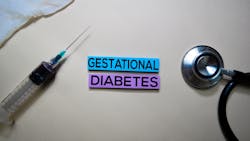Kaiser Permanente researchers have identified several biological markers in the blood of pregnant women that are tied to an increased risk of developing gestational diabetes later in pregnancy, according to a news release.
They reported the findings in the journal Diabetes.
“Using verified patient data, advanced data analysis, and double-verification, we found distinct metabolic profiles as early as gestational weeks 10 to 13,” said lead author Yeyi Zhu, PhD, a research scientist with the Kaiser Permanente Division of Research. “These findings could lead to the development of new laboratory tests for the disease, and help understanding of the biological mechanisms that lead to a gestational diabetes diagnosis.”
The findings add to an area of study known as diabetes metabolomics, which focuses on identifying metabolites — end-products of bodily processes, such as the use of energy. People who have certain metabolites in their blood may be at higher risk of developing diabetes. Gestational diabetes develops in pregnancy and can increase risk of complications to the mother — such as preeclampsia and early birth — as well as long-term metabolic and cardiovascular problems.
Gestational diabetes is typically identified between 24 and 28 weeks of pregnancy by checking blood glucose, but methods to identify it sooner could benefit patients, said senior author Assiamira Ferrara, MD, PhD, senior research scientist with the Division of Research. “Early predictive biomarkers for gestational diabetes could be quite valuable for preventing and treating this condition earlier in pregnancy, and potentially reducing its impact on mothers and their fetuses,” she said.
The study had a larger number of patients with gestational diabetes (91) than many previous studies, and the patients were relatively diverse in background, Zhu said. Also strengthening the findings, she said, were use of verified information about diagnosis, blood sugar levels, and other health status information from the patients’ medical records.
The investigators used patient data from the PETALS study, a long-term study tracking lifestyle factors and health status of 3,346 pregnant patients of Kaiser Permanente Northern California. The fasting blood samples were analyzed by the National Institutes of Health West Coast Metabolomics Center at the University of California, Davis.
The analysis resulted in a panel of 17 metabolites found during pregnancy weeks 10 to 13; the researchers compared the panel’s association with a later gestational diabetes diagnosis with conventional gestational diabetes testing. The experimental model outperformed typical risk factors for gestational diabetes such as obesity, family history of diabetes, and history of gestational diabetes, as did another panel of 13 metabolites identified during pregnancy weeks 17 to 19.
The ability of the panels to predict gestational diabetes risk was first validated in a sub-group of PETALS participants and then in participants in the GLOW trial, a previous Division of Research study that provided health coaching to about 200 pregnant individuals. The double-validation of the biomarkers was a notable strength of their study which was largely missing in previous studies, Zhu said.
The study confirmed well-known metabolic pathways for diabetes, such as the breakdown of blood sugars, as related to gestational diabetes. It also suggested a role for other metabolic mechanisms, such as those involved in microbiota in the gut.
“Our findings suggest a potential value of metabolomics profiling for early prediction of gestational diabetes risk,” Zhu said.

